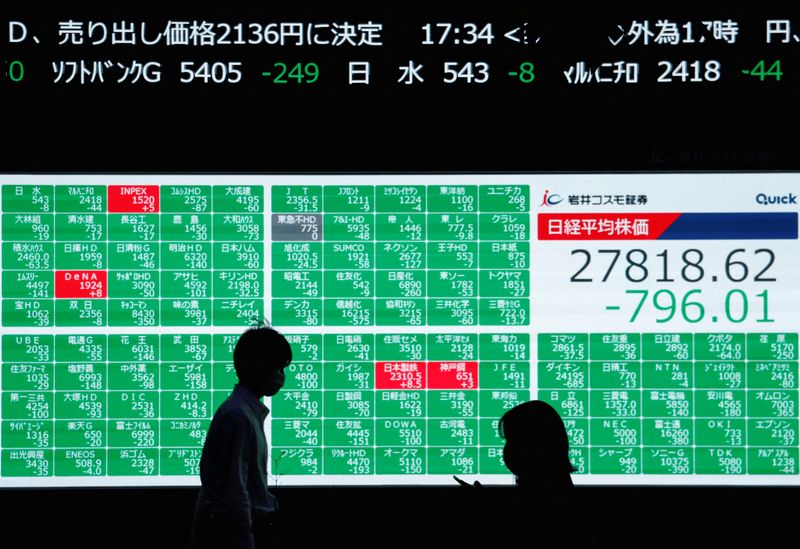By Stephen Culp
NEW YORK (Reuters) - U.S. stocks tanked and the dollar eked out a small gain on Thursday as solid economic data fueled worries that the Federal Reserve's monetary policy will hover at restrictive levels for longer than many market participants may have hoped.
The S&P 500 and the Dow lost 1.5% and 1.1%, respectively, while semiconductor stocks and interest rate-sensitive megacaps pulled the tech-laden Nasdaq down 2.2%.
The sell-off helped bolster the greenback against a basket of world currencies.
"It’s a flight to safety because investors are becoming increasingly concerned of a recession coming in 2023," said Sam Stovall, chief investment strategist of CFRA Research in New York.
Stovall likened hopes of avoiding a recession to a "deflating holiday lawn ornament," adding that "investors have given up on the prospect of a soft landing and now have to decide just how hard the landing will be."
With the penultimate week of a dire year drawing to a close, hopes of a "Santa Claus rally" in the last days of 2022 are fading as investors prepare to close the book on the worst year for the stock market since 2008, the nadir of the Great Recession.
"2008 was a horrible year," said Keith Buchanan, portfolio manager at GLOBALT Investments in Atlanta. "That bad market followed you home."
But in 2022, "there was nowhere to hide, the pain is more widespread," Buchanan added.
Data released before the bell showed an upward revision to GDP and relatively low claims for unemployment benefits.
While such data would normally be viewed positively, amid the central bank's tightening phase it fuels investor fear that the Fed funds target rate could rise higher and stay there longer than previously expected, raising the possibility of an economic contraction.
The Dow Jones Industrial Average fell 348.99 points, or 1.05%, to 33,027.49; the S&P 500 lost 56.05 points, or 1.45%, to 3,822.39 and the Nasdaq Composite dropped 233.25 points, or 2.18%, to 10,476.12.
European stocks lost ground, reversing an earlier rally to follow Wall Street lower as worries over aggressive monetary policy proved contagious.
The pan-European STOXX 600 index lost 0.97% and MSCI's gauge of stocks across the globe shed 0.98%.
Emerging market stocks rose 1.16%. MSCI's broadest index of Asia-Pacific shares outside Japan closed 1.19% higher, while Japan's Nikkei rose 0.46%.
Treasury yields were mixed and the yield curve inversion deepened after data showed U.S. economy grew at a faster pace than previously reported.
Benchmark 10-year notes last fell 1/32 in price to yield 3.686%, from 3.684% late on Wednesday.
The 30-year bond last fell 1/32 in price to yield 3.7457%, from 3.744% late on Wednesday.
The dollar inched higher as the safe-haven currency benefited from a flight to safety, amid jitters over long-term restrictive interest rates.
The dollar index rose 0.24%, with the euro down 0.11% to $1.0591.
The Japanese yen strengthened 0.08% versus the greenback at 132.39 per dollar, while Sterling was last trading at $1.2032, down 0.42% on the day.
The upbeat data prompted crude prices to reverse earlier gains by the end of a volatile session, as unease over the Fed's policy tightening offset supply concerns and a severe winter storm bore down on much of the United States.
U.S. crude fell 1.02% to settle at $77.49 per barrel, while Brent settled at $80.98 per barrel, down 1.48% on the day.

Gold slid in opposition to the greenback's rise after data underscored U.S. economic resiliency amid the Fed's battle against inflation.
Spot gold dropped 1.3% to $1,791.51 an ounce.
